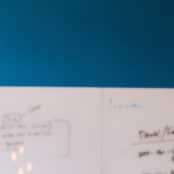
Whether you’re working for a company that someone else started or running a solo design business, starting your own design studio is a big dream — one that comes with significant responsibility.
You’re responsible not only for your own income and projects, but also for making sure everyone who works for the studio:
- Maintains the quality and service that your clients expect.
- Has enough work to keep the business operating.
- Receives their salary on time.
That said, others have done it, and you can, too. To begin transforming that dream into a reality, look away from the scary responsibility and start with the dream. As you begin to translate your dreams for your business into a brand and a business plan, the responsibilities can start to become manageable.
Define your agency’s brand
Your brand communicates your agency’s unique value to clients, employees, and the community. Although an agency is more than just you, as a founder, your values, interests, and skills shape what the agency offers. So defining your agency’s brand begins with some soul searching.
To kick off the process, these questions can help you pinpoint details that can help define your agency’s brand:
- What types of projects or designs do want your agency to provide?
- If you’d like to specialize in any specific industry, product, or service, what are those?
- How would you describe your agency’s design aesthetic or attitude?
- What types of clients would you like to work with?
- How do those clients feel or what do they need when they’re looking for an agency?
- What would you like the atmosphere of your office to feel like?
- How would you describe the feeling that you’d like clients to have as they work with you?
For some inspiration, check out these awesome agency websites.
Give yourself a chance to develop your ideas as much as you want. When you’ve generated specific details that jibe with the agency you want to create, consider how those details might translate into specific brand elements such as the following:
- Visual identity (logo, fonts, colors)
- Tone of voice (friendly, funny, serious, compassionate)
- Promise (the quality of your designs and the service clients receive)
Develop a business and marketing plan
You knew this article would recommend a business plan, and I do not want to disappoint. The business plan is especially important if you want to start an agency because it forces you to develop a complete grasp of your market, your business goals, and how you’ll measure whether you’re meeting those goals.
If you’re a creative type, the branding might come easier to you than the business plan. However, the business plan may be the hurdle you need to jump in order to transition from dream agency to real agency. If you’re nevertheless dragging your feet, get help. Here are few places that support prospective business owners:
- The U.S. Small Business Administration has an online tool that guides you through creating a business plan.
- Your local chamber of commerce, workforce development agency, or local library may offer workshops that help small business owners create a business plan. A workshop forces you to set a time and place to develop your plan and helps your break down the steps in a supportive environment.
There are also plenty of online resources, such as this article about developing a marketing strategy for your agency.
Clarify roles and responsibilities
You know how law offices typically have names like Fisher, Cook & Bell — because the office is named after the partners? Although design agencies typically have more creative names, your agency probably includes at least one partner, too.
I wrote about defining roles and responsibilities when you’re collaborating with a partner. If your partner is also your agency co-founder, you likely both have a hand in finding clients, managing projects, and keeping the finances in order. In addition, you may have one or more employees to help you handle your agency’s workload. Here are some examples:
- One or more designers may support your agency’s ability to take on bigger projects.
- A operations manager can keep the day-to-day business running smoothly. For example, the person in this role might resolve problems with clients’ websites, keep your own technical infrastructure in shape, and handle any issues related to your physical office space.
Like many businesses before you, your design agency can start small, with most employees playing a few different roles, and add employees as your agency grows.
Your business plan can help you understand what employees your agency can afford or whether you’re on track to add them. However, how you divvy up roles and responsibilities depends on the skills and interests the partners bring to the agency. Discuss your strengths and weaknesses with your partner. Also, consider what roles or work can best support your business goals and help you maintain a healthy business.
Organize your finances
After you set up your agency as a legal entity (mostly likely an LLC, partnership, or corporation), you can start to organize and set up your agency’s finances. Depending on how much seed money you have and the strength of your business plan, you might also consider taking out a loan to cover your startup expenses. Beyond that, you need to have the following basics in place before you officially open your doors:
- Dedicated business bank accounts, checks, and credit cards: These are all fairly straightforward, and your banker can help you.
- Taxes and payroll: If you or a partner have an accounting background, you might handle these yourself. Alternately, your accountant can help you determine what records you need to keep for tax purposes and the best way to set up payroll.
- Bookkeeping: You don’t necessarily need to keep the books yourself, but you do need to know how to read and analyze them. If you’re not familiar with bookkeeping, do yourself and your dreams a favor by learning basic bookkeeping so that you can accurately assess the financial health of your business.
- Insurance: Business insurance protects your business and your property against damage and litigation. You might also need additional coverage depending on the industry in which you specialize. To make sure you’re purchasing the right policy for your agency and the work you do, find an insurance broker with experience helping web design agencies purchase insurance.
Set up an office
Do you want your studio to have a physical office or a virtual office?
- A physical office communicates your commitment to your business and fosters bonds and communication among employees. However, physical office space costs money.
- Virtual office space can eliminate a large expense, but makes bonding and collaborating with coworkers a litte more difficult.
If you like the idea of physical office space but aren’t quite ready to commit, consider a hybrid option, where everyone mostly works remotely but meets face-to-face on a regular basis. If your agency is just three or four people, this setup can give you a little financial flexibility as you get started. Coworking spaces enable you to rent a meeting room for both client meetings and regular collaboration within your agency.
Keep in mind that your physical space, or lack thereof, impacts how you’ll set up your agency’s technical infrastructure, too. In a physical space, you can set up a physical network that enables everyone to share files, and it’s easier to have large desktop computers. In a virtual or hybrid setup, cloud-based file-sharing might be more convenient, but you also need to make sure your client files are secure and backed up elsewhere.
Starting an agency is an exciting adventure, but also a demanding one. However, a clear brand identity and business plan will help you lay the groundwork for a successful venture and understand how to best use your resources for hiring employees, maintaining a healthy balance sheet, and opening your doors for business.











Comments ( 0 )